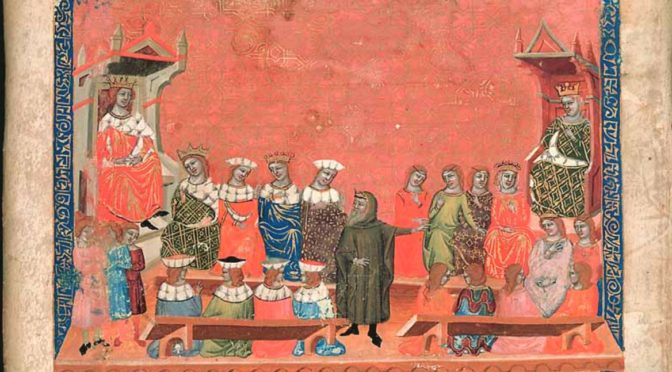Si on en croit la compréhension dominante, la nation est le produit de la modernité (révolution industrielle, capitalisme, unification linguistique, généralisation de l’imprimerie, démocratisation scolaire, etc.). Toutefois, les nations ne sont pas apparues ex nihilo au XVIIIe siècle. Les tentatives traditionnelles d’expliquer cette émergence ne satisfont pas les universitaires puisqu’elles se concentrent sur le moment où la nation est devenue le mode d’organisation politique hégémonique, le XIXe siècle. Ce faisant, elles échouent à décrire le long processus qui a mené à cette hégémonie. Cette conférence se propose de réexaminer la définition et la généalogie de la nation.
Date : 3, 4 et 5 mai 2023
Lieu : Campus de l’Université d’Europe centrale (Vienne) & en ligne : https://bit.ly/3TRxGjT
Organisateur : Département des études médiévales de la Central European University
Financeurs/coorganisateurs : ACRO (CEU), IMAFO (Austrian Academy of Sciences), FPPCHA (Lausanne), CRHiDI (Université Saint-Louis – Bruxelles), CEFRES (Prague) et Stadt Wien Kultur.
Langue : anglais
Programme
Wednesday, May 3, 2023
8:30-9:00 coffee
9:00-9:15: Welcoming speech
9:15-9:45: Eloïse Adde (CEU, Vienna, AT): Introduction
- Before or without the nation 9:45-12:15
CHAIR: Walter Pohl (university of Vienna)
Patrick Geary (IAS, Princeton, US) The Pre-History of the Medieval Nation: from the Imperium Romanum to Regna in Late Antiquity (400-800)
Daniel Ziemann (CEU, Vienna, AT) From Bulgars to Bulgarians – The Problem of National Identity in the First Bulgarian Realm (681-1018)
10:45-11:15: Break
Igor Mineo (University of Palermo, IT) A nationless space? Autonomies and state building processes in the Italian peninsula
Michael Depreter (University of Oxford, UK) From merchant to soldier: what is in a nation?
12:15-13:45 LUNCH
- The sources of the nation. Imperial idea, confession, regions 13:45-16:15
CHAIR: Andreas Zajic (IMAFO, AAS)
Przemysław Wiszewski (university of Wroclaw, PL) Medieval communities on the border. Catalonia, Silesia, and Transylvania – on the verge between nation and regional community.
Daniel Bagi (ELTE Budapest, HU) Nation building, regional identity in the Styrian Rhymed Chronicle of Otacher aus der Gaal
14:45-15:15: Break
Len Scales (University of Durham, UK) “For love of you I have given up my Saxons and all Germans.” Emperors, Rome, and nation
Mikhail V. Dmitriev Natio and confessio in medieval Rus’: what was different from medieval Poland and the “Latin” West? ONLINE +2h
16:15-16:45: Break
- Defining and delimiting national communities. Internal and external forces in interplay 16:45-17:45
CHAIR: Katalin Szende (CEU, Vienna)
Cathleen Sarti (University of Oxford, UK) The Importance of the “Other” – Emerging National Identity in Scandinavia, 1397-1599
Roman Tymoshevskyi (CEU, Vienna, AT) The ruler’s depositions and political community in England and Holy Roman Empire, 1298-1327
Thursday, May 4, 2023
- Defining and delimiting national communities. Internal and external forces in interplay (2nd part) 9:00-10:00
CHAIR: Katalin Szende (CEU, Vienna)
Jakub Razim (Palacký University, Oloumoc, CZ) Excommunication as a tool for shaping a legal and religious community. A case study on a canonical procedure in medieval Bohemia
Eric Bousmar (Saint-Louis University, BE) The Burgundian State Formation from Within and from Below. A view from Hainault: networks, dynasty, and nation in the eyes of the memorialist Jean de Haynin
10:00-10:30 Break
- Images and symbols of the nation. Between self-perception and (self-)representation 10:30-12:30
CHAIR: Jonathan Dumont (IMAFO, Austrian Academy of Sciences)
Flocel Sabate (University of Lleida, ES) The Catalan nation in the late Middle Ages: perception and representation
Mario Damen (University of Amsterdam, NE) The construction and perception of a legal landscape in the late medieval Low Countries
11:30-12:00 Break
Marcin R. Pauk (University of Warsaw, PL) Saint patron, peace, and princely jurisdiction: the process of early institutionalization of state power in Central Europe (12th – 13th century)
12:30-14:00 LUNCH
- Narration, language(s), history, literature. Nation as a cultural project? 14:00-17:00
CHAIR: Anja Božič (CEU, Vienna)
Claudia Wittig (Martin Luther University Halle-Wittenberg, GE) Administrating History. “National” History and State Building in Later Medieval France
Benoît Grévin (CNRS, FR) Natio or lingua? Revisiting a semantic couple (1200-1600)
15:00-15:30: Break
Julia Verkholantsev (University of Pennsylvania, USA) The Dynamics of Literary Beginnings and the Question of National Narrative: the Cases of Czech, Polish and Croatian Literatures
Arthur Pérodeau (EHESS, Paris, FR) Analyzing the national feeling through the interest in historical works. The spread and reception of Cosmas’ chronicle till the beginning of the 13th century
Camille Rutsaert (UCL/Saint-Louis University, BE) Duchesse Joanna (1355-1406) and the idea of a Brabant’s Nation. An historical representation or an historiographical construction?
Friday, May 5, 2023
- The “nation of the individuals”. Subjectivity, emotions, stereotypes, expectations
9:00-12:00
CHAIR: Balazs Nagy (ELTE, Budapest and CEU, Vienna)
Philippe Urfalino (EHESS, Paris, FR) The nation, as a collection of individuals
Andrzej Pleszczyński (UMCS, Lublin, PL) The genesis and character of the Polish self-stereotype as a determinant of cultural and national identity
10:00-10:30
Corinne Leveleux (University of Orleans, FR) Writing law in 13th century France. Between social expectations and political communication
Julia Burkhardt (LMU, Munich, GE) A nation and its foreigners. Discourses and possibilities of political participation in Hungary (1490-1526) ONLINE
Michał Machalski (CEU, Vienna, AT) Loyalty and Langauge in Warsaw Trial of 1339
12:00-13:00 Conclusive discussion

